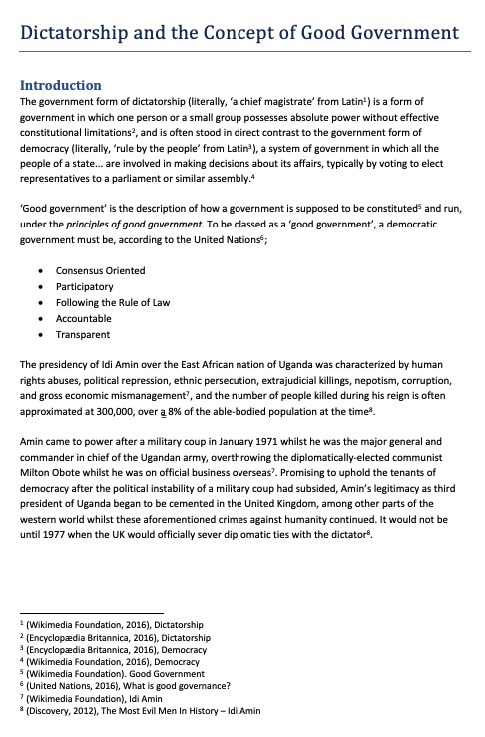Dictatorship vs Good Governance – Politics and Law Notes
Summary:
The text discusses the concept of dictatorship and good government, using the example of Idi Amin’s presidency in Uganda as a contrasting case to democratic principles. It examines five key aspects of good government (consensus-oriented, participatory, following the rule of law, accountable, and transparent) and how they were disregarded under Amin’s rule. The analysis highlights the absence of these principles in a dictatorship, where one person holds absolute power, resulting in human rights abuses, lack of accountability, and suppression of public participation. The conclusion emphasizes that Amin’s regime goes against the core values of democracy, denying citizens their rights and voices.
Excerpt:
Dictatorship vs Good Governance
Dictatorship and the Concept of Good Government
Introduction
The government form of dictatorship (literally, ‘a chief magistrate’ from Latin[1]) is a form of government in which one person or a small group possesses absolute power without effective constitutional limitations[2], and is often stood in direct contrast to the government form of democracy (literally, ‘rule by the people’ from Latin[3]), a system of government in which all the people of a state… are involved in making decisions about its affairs, typically by voting to elect representatives to a parliament or similar assembly.[4]
‘Good government’ describes how a government should be constituted[5] and run, under the principles of good government. To be classed as a ‘good government, a democratic government must be, according to the United Nations[6];
- Consensus Oriented
- Participatory
- Following the Rule of Law
- Accountable
- Transparent
The presidency of Idi Amin over the East African nation of Uganda was characterized by human rights abuses, political repression, ethnic persecution, extrajudicial killings, nepotism, corruption, and gross economic mismanagement[1], and the number of people killed during his reign is often approximated at 300,000, over an 8% of the able-bodied population at the time.
Amin came to power after a military coup in January 1971 whilst he was the major general and commander in chief of the Ugandan army, overthrowing the diplomatically-elected communist Milton Obote whilst he was on official business overseas.


Reviews